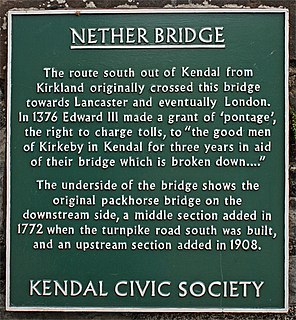 W
WA toll road, also known as a turnpike or tollway, is a public or private road for which a fee is assessed for passage. It is a form of road pricing typically implemented to help recoup the costs of road construction and maintenance.
 W
WMorocco's network of motorways is administered by the state-owned company Autoroutes du Maroc (ADM). It runs the network on a pay-per-use basis, with toll stations placed along its length. The general speed limit is 120 km/h.
 W
WA barrier toll system is a method of collecting tolls on highways using toll barriers at regularly spaced intervals on the toll road's mainline. Motorists are typically charged a flat-rate toll, unlike toll roads with a ticket system where the toll rate is determined by the distance traveled or number of exits passed. Some highways use coin-drop machines on toll plazas. For toll roads whose ramps have no toll plazas, it is possible to exit the toll road before the mainline toll plaza, use local streets to bypass it, then re-enter the highway via an interchange on the other side of the toll plaza. Thus it is possible to drive on some barrier toll roads while paying less or not paying at all; this is the basis of the "open" descriptor.
 W
WEuropean route E73 forms part of the United Nations International E-road network, connecting Hungary and eastern Croatia to Bosnia and Herzegovina and the Adriatic Sea in the vicinity of the port of Ploče. This 702-kilometre (436 mi) route is also designated as the Pan-European Corridor Vc, a branch of the fifth Pan-European corridor. The route largely consists of two-lane roads with at-grade intersections, although in the 2000s, about a third of the route was upgraded to motorway standards. The remainder of the route is currently being upgraded in all the countries spanned. The longest part of this corridor goes through Bosnia and Herzegovina and is widely touted as a road instrumental to the development of the country. The road also serves as the shortest connection of the eastern and southern parts of Croatia.
 W
WA high-occupancy toll lane is a type of traffic lane or roadway that is available to high-occupancy vehicles and other exempt vehicles without charge; other vehicles are required to pay a variable fee that is adjusted in response to demand. Unlike toll roads, drivers have an option to use general purpose lanes, on which a fee is not charged. Express toll lanes, which are less common, operate along similar lines, but do not exempt high-occupancy vehicles.
 W
WHighway 6, also known as the Trans-Israel Highway or Cross-Israel Highway, is a major electronic toll highway in Israel. Highway 6 is the first Israeli Build-Operate-Transfer road constructed, carried out mainly by the private sector in return for a concession to collect tolls on the highway for a given number of years. It is also one of the largest infrastructure projects undertaken in Israel.
 W
WThe Liniengeld was a historic road toll that had to be paid on entering the city of Vienna in Austria from the 18th century.
 W
WGermany's LKW-Maut is a toll for goods vehicles based on the distance driven in kilometres, the emission category of the vehicle and the number of axles.
 W
WPontage was a term for a toll levied for the building or repair of bridges dating to the medieval era in England, Wales and Ireland.
 W
WThe Rabat–Fes expressway is an expressway in Morocco; its designated identity marker is A2. Its total length is 190 km.
 W
WRodovia Dom Pedro I is a highway in the state of São Paulo, Brazil.
 W
WSalik is the name given to the electronic toll road system in Dubai, United Arab Emirates, which is based on RFID technology, automatically deducting a fee when a toll gate is passed under. The Salik toll was launched by Dubai's Dubai Roads and Transport Authority (RTA) on 1 July 2007.
 W
WThe Sound Dues were a toll on the use of the Øresund, or "Sound" strait separating the modern day borders of Denmark and Sweden. The tolls constituted up to two thirds of Denmark's state income in the 16th and 17th centuries. The dues were introduced by King Eric of Pomerania in 1429 and remained in effect until the Copenhagen Convention of 1857. Tolls in the Great Belt had been collected by the Danish Crown at least a century prior to the establishment of the dues by Eric of Pomerania.
 W
WA ticket system, also known as a closed toll collection system, is a toll-collection system used on some toll roads in which a motorist pays a toll rate based on the distance traveled from their originating entrance to their destination exit.
 W
WA tollbooth is a booth placed along a toll road, often in a toll plaza, that collects a toll. They have historically been staffed by transportation agents who manually collect the toll, but, in the modern day, many have been replaced with automatic electronic toll collection systems, such as E-ZPass in the Northeastern United States.
 W
W